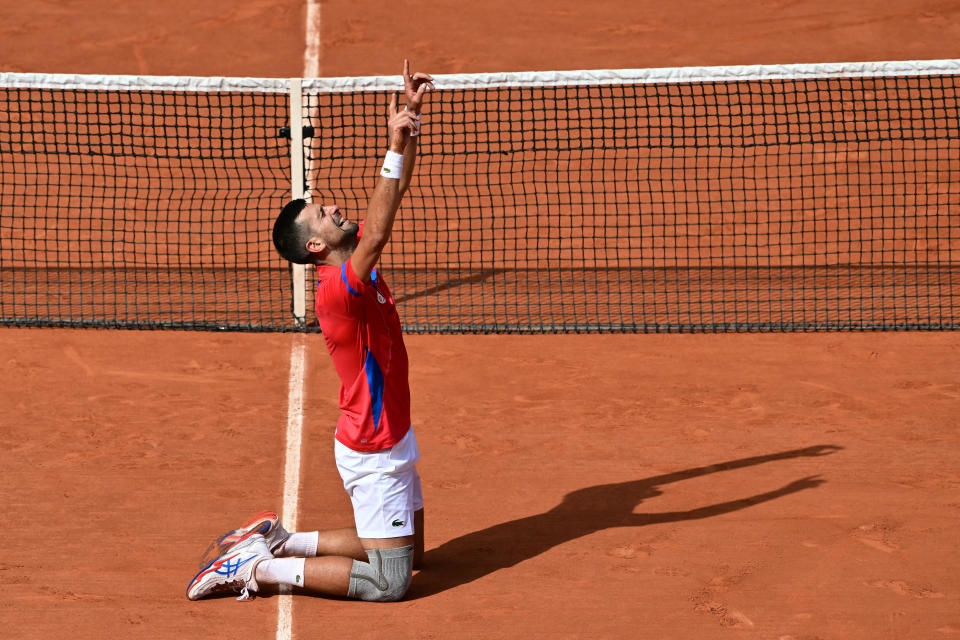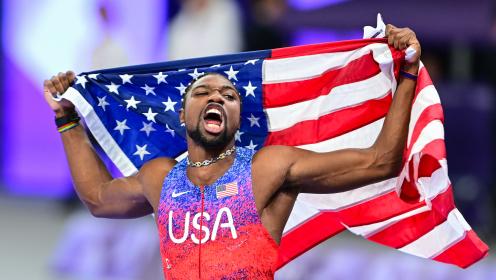Medal table | Olympic schedule | How to watch | Olympic news
PARIS — The most anticipated gold medal match in Olympic tennis history — and one of the hottest tickets in Paris — delivered on its promise with a wildly entertaining two-setter and a legendary champion.
Serbia’s Novak Djokovic defeated Spain’s Carlos Alcaraz, 7-6 (7-3), 7-6 (7-2) in a thriller on Sunday at Court Philippe-Chatrier to win his first gold medal and become the oldest men’s Olympic singles champion at age 37.
Djokovic is coming off minor meniscus surgery, but you wouldn’t have known that watching the first set, which was a truly epic back and forth. He saved eight break points against the 21-year-old Alcaraz, who beat him in the Wimbledon final just three weeks ago.


The second set was just as thrilling, with the crowd alternating between “Novak! Novak!” and “Carlos! Carlos!” chants as the two men traded points.
Appropriately, it came down to a second tiebreak, with Djokovic powering a forehand out of Alcaraz’s reach for the victory. At that point, he fell to his knees in celebration, before making his way into the stands to celebrate with his family.
With a record 24 Grand Slam singles titles, 98 career titles and a record 428 weeks atop the ATP rankings, Djokovic has soared to the mountaintop of men’s tennis. The Olympics were the only real hole on his resumé. He won bronze in 2008 (Beijing) before missing the podium three straight times, finishing fourth in 2012 (London) and 2021 (Tokyo) and suffering a shocking first-round exit in 2016 (Rio).
This victory — over the reigning French Open and Wimbledon champion, no less — surely solidifies his case as the Greatest of All Time (G.O.A.T.) over Roger Federer, who never won Olympic singles gold, and Rafael Nadal, who won in 2008. Nadal, who lost to Djokovic last week, can no longer hold his gold medal over him.
Within tennis circles, winning a gold medal doesn’t hold the same weight as winning a Grand Slam due in part to the sport’s 64-year absence from the Games (1924-1988) and the best-of-three sets format. But perhaps Djokovic’s title will be looked at differently given he won at a Grand Slam venue against a four-time Grand Slam champion.
Then again, maybe it won’t: He didn’t face a single top-10 player en route to the gold medal match (No. 11 Stefanos Tsitsipas was his highest-ranked opponent), and the men’s singles field — while relatively strong — didn’t feature world No. 1 Jannik Sinner, who withdrew with tonsillitis.
Alcaraz, the youngest man to ever play in a men’s singles final, now adds Olympic silver to his four major titles — all before his 22nd birthday. While he failed to win in Paris, it was a tournament he’ll never forget: playing Djokovic in the final and playing alongside Nadal in what were perhaps his idol’s final matches at Roland-Garros.
With Sunday’s victory, Djokovic improved to 4-3 against the young Spaniard, who is surely the future face of the sport and would likely be the present face if not for the legendary Serb who refuses to go away.

